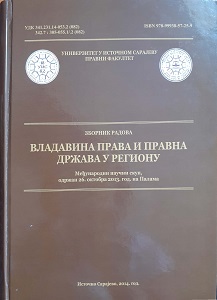Дводомни систем као јемство правне државе у српској уставној историји
Bicameral System as a Guarantee of Rule of Law in Serbian Constitutional History
Author(s): Maša Kulauzov
Subject(s): Law, Constitution, Jurisprudence, History of Law, Governance, Political history
Published by: Правни факултет Универзитета у Источном Сарајеву
Keywords: Bicameral system;Senate;National Assembly;Legislation;Rule of law;Legality;Legal security;Separation of powers;
Summary/Abstract: The idea of introducing Senate in Serbian constitutional system app-eared in articles, constitutional drafts and committees in the second half of 19th century. However, bicameral National Representative Body was envisaged for the first time in the Constitution of the Kingdom of Serbia of 1901. Considering the fact that bicameral structure of National assembly had not been known in antecedent Serbian constitutional history, we could come to the conclusion that the authors of the Constitution relied on foreign models when introducing this novelty. That is the reason why the author of this paper points out to foreign influences on the Constitution.Although existence of two houses of legislature complicates legislative procedure, it also improves quality of legislative work and intellectual structure of National Representative Body. On the other hand, bicameral legislative body contributes considerably to realization of principles of the rule of law, such as legality, legal security and separation of powers. Due to advantages of bicameral over unicameral system, Serbian constitutions of 1869 and 1888 introduced some substitutes for upper house of legislature. These were one third of deputies appointed by knez in the Constitution of the Principality of Serbia of 1869, and two deputy candidates with university degree in each electoral unit and certain legislative power of State Council in the Constitution of the Kingdom of Serbia of 1888.
- Page Range: 793-801
- Page Count: 9
- Publication Year: 2013
- Language: Serbian
- Content File-PDF

